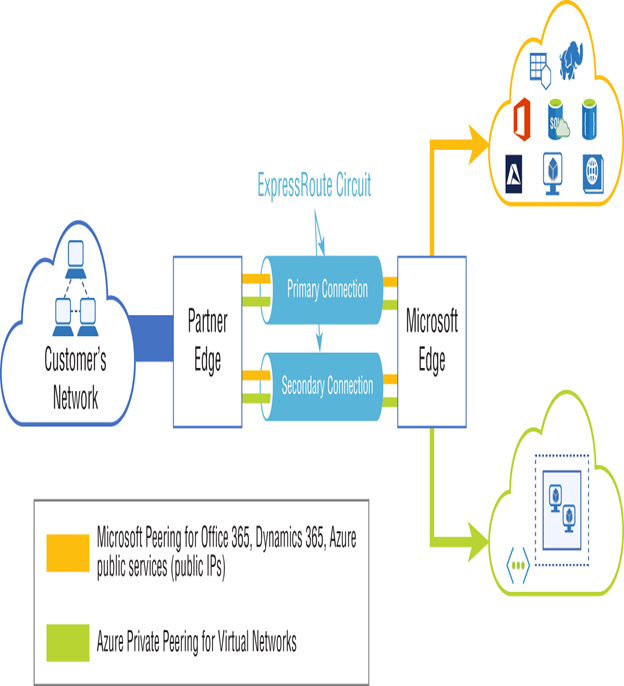Like VPN, ExpressRoute helps us to extend on-premises network into the Microsoft cloud. A connection provider facilitates the connection and can be used to establish connections to Microsoft cloud services, such as Microsoft Azure, Microsoft 365, and Dynamics 365. The public Internet is not involved in the case of ExpressRoute. Therefore, ExpressRoute connections offer faster speed, lower latency, security, and higher reliability compared to other connectivity models. Figure 4.16 shows an overview of an ExpressRoute connection from on-premises to the Microsoft cloud.

FIGURE 4.16 ExpressRoute connectivity
Using ExpressRoute, you can directly connect to the Microsoft cloud from your existing WAN. This connectivity can be established using a multiprotocol label switching (MPLS) VPN. This MPLS will be provided by the network provider. The bandwidth of the VPN gateway is limited to 10 Gbps; however, ExpressRoute provides bandwidth up to 100 Gbps. Because of this very high bandwidth, ExpressRoute is the perfect choice for scenarios such as data migration, data replication, and disaster recovery. ExpressRoute is also the best candidate for moving larger datasets from on-premises to Azure.
ExpressRoute is for extending an on-premises datacenter to the cloud. You can add additional compute and storage capacity to your existing datacenter using ExpressRoute. You can expand the infrastructure, which is ideal for scaling scenarios when required. Since the latency is much less, you don’t need to negotiate on the network performance. As the traffic is not routed through the Internet, you can easily build hybrid applications without comprising performance or privacy. For example, you can deploy an application front end in Azure, and the backend datastore can be hosted on-premises for data compliance requirements. Here, you can use ExpressRoute to have private communication between the database and Azure servers. This traffic will be secured as it is not routed through the public Internet. Now that you have a fundamental idea about ExpressRoute, let’s take a look at the advantages of ExpressRoute.
Benefits
The following are the benefits of ExpressRoute:
- L3 connectivity: ExpressRoute offers layer 3 connectivity. Microsoft leverages BGP to propagate the routes between your instances in Azure, on-premises network, and Microsoft public IP addresses. For different traffic profiles, multiple BGP sessions are created.
- Redundancy: Every circuit in ExpressRoute comprises an active-active configuration. This configuration includes two connections to the Microsoft edge routers from your network edge or provider network edge.
- Access to Microsoft cloud: ExpressRoute is not only for Azure, but you can also use it to connect to Microsoft 365 services and Microsoft Dynamics 365.
- Cross-region connectivity: You can use ExpressRoute to connect two Azure regions for establishing a low-latency, high-bandwidth connection.
- ExpressRoute premium add-on: Using the premium add-on feature, you can extend the connectivity across all regions.
- ExpressRoute global reach: You can enable the global reach to connect your on-premises sites using ExpressRoute. This is useful to establish low-latency connectivity between on-premises. The traffic will always traverse through Microsoft’s network.
- Choice of bandwidth: You can purchase ExpressRoute circuits based on your bandwidth requirements. You can choose from 50 Mbps to 100 Gbps. It’s recommended that you always check with your connectivity provider to verify if they can support this bandwidth.
- Billing tiers: ExpressRoute offers three different billing models that suit your connection requirements. You can pick any of the following models:
- Unlimited: The billing is based on a monthly fixed charge. The ingress and egress data charges are included in the fixed fee and is free of additional cost.
- Metered: There will be a monthly fee for the circuit. You will be charged per gigabyte for the egress data; however, the ingress is free of cost.
- Premium add-on: This is ideal for customers who require a larger number of BGP routes, or more virtual network links per circuit can enable the premium add-on.
While we were discussing the benefits, we constantly used the term circuit. Since we haven’t explained this concept yet, in the next section you will learn about ExpressRoute circuits and routing domains.
Leave a Reply